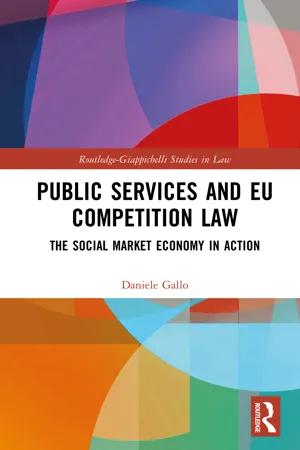
- 162 pages
- English
- ePUB (mobile friendly)
- Available on iOS & Android
About this book
This monograph, which was also designed as a short reference book for specialized undergraduate and graduate courses on EU law, intends to shed light on, and legally frame, the evolution of the doctrine of services of general economic interest (SGEIs). The book emphasizes the pivotal role played by SGEIs in striking a fair balance between market and social objectives. To this end, the book claims, first of all, that SGEIs have a dual nature inasmuch as they act as a limitation to/derogation from the free market and, simultaneously, as a value and positive obligation addressed at national authorities, undertakings, and EU institutions. The EU notions of access to public services and universal service are the clearest signal of such phenomenon. Secondly, the book claims that the transfer of competences from the Union to the Member States and the reaffirmation of Member States' sovereignty in crucial sectors of the economy are not the only solutions to foster social rights. In fact, this narrative is apt to undermine the foundations, spirit, and purpose of the process of European integration, especially at a time like the present, when new forms of populism and anti-Europeanism are on the rise, and when a European response is imperative to counter the spread of the coronavirus in European countries. The book concludes that SGEIs' regulation is an area of law where the EU institutions have generally successfully put into action and consolidated the social market economy principles on which the EU was founded. This is even further proof that the EU is not merely the reflection of interests linked to market completion, but also and foremost a 'Community based on the rule of law'.
The book will be a valuable resource for academics and researchers in EU Law, European Public Law and EU competition law.
Frequently asked questions
- Essential is ideal for learners and professionals who enjoy exploring a wide range of subjects. Access the Essential Library with 800,000+ trusted titles and best-sellers across business, personal growth, and the humanities. Includes unlimited reading time and Standard Read Aloud voice.
- Complete: Perfect for advanced learners and researchers needing full, unrestricted access. Unlock 1.4M+ books across hundreds of subjects, including academic and specialized titles. The Complete Plan also includes advanced features like Premium Read Aloud and Research Assistant.
Please note we cannot support devices running on iOS 13 and Android 7 or earlier. Learn more about using the app.
Information
Chapter VISERVICES OF GENERAL ECONOMIC INTEREST AND STATE AID
- SUMMARY
- 1. The Historical and Legal Background on the Financing of Services of General Economic Interest Prior to the “Almunia Package”
- 2. The “Almunia Package” and the Social Dimension of State Aid
- 3. The Commission's Sectorial Practice after the “Almunia Package” and the Relevant Case Law of the CJEU
- 4. The Developments Regarding Economic Social Services of General Interest
- 5. The New Temporary Framework on State Aid in the Context of the Coordinated Economic Response to the COVID-19 Outbreak
1. The Historical and Legal Background on the Financing of Services of General Economic Interest Prior to the "Almunia Package"
2. The "Almunia Package" and the Social Dimension of State Aid
Table of contents
- Cover
- Half Title
- Title
- Copyright
- Dedication
- Table of Contents
- Acknowledgments
- Foreword
- Abbreviations
- Introduction. Background, Aims, Scope and Structure of the Book
- I. The Elusive Notion of Service of General Economic Interest
- II. Rationale, Content and Scope of Article 106(2) TFEU
- III. Services of General Economic Interest beyond Article 106(2) TFEU
- IV. Distribution of Competences between Member States and the EU
- V. Services of General Economic Interest and the Abuse of Dominant Position
- VI. Services of General Economic Interest and State Aid
- Conclusions
- Case Law
- Bibliography
- Index